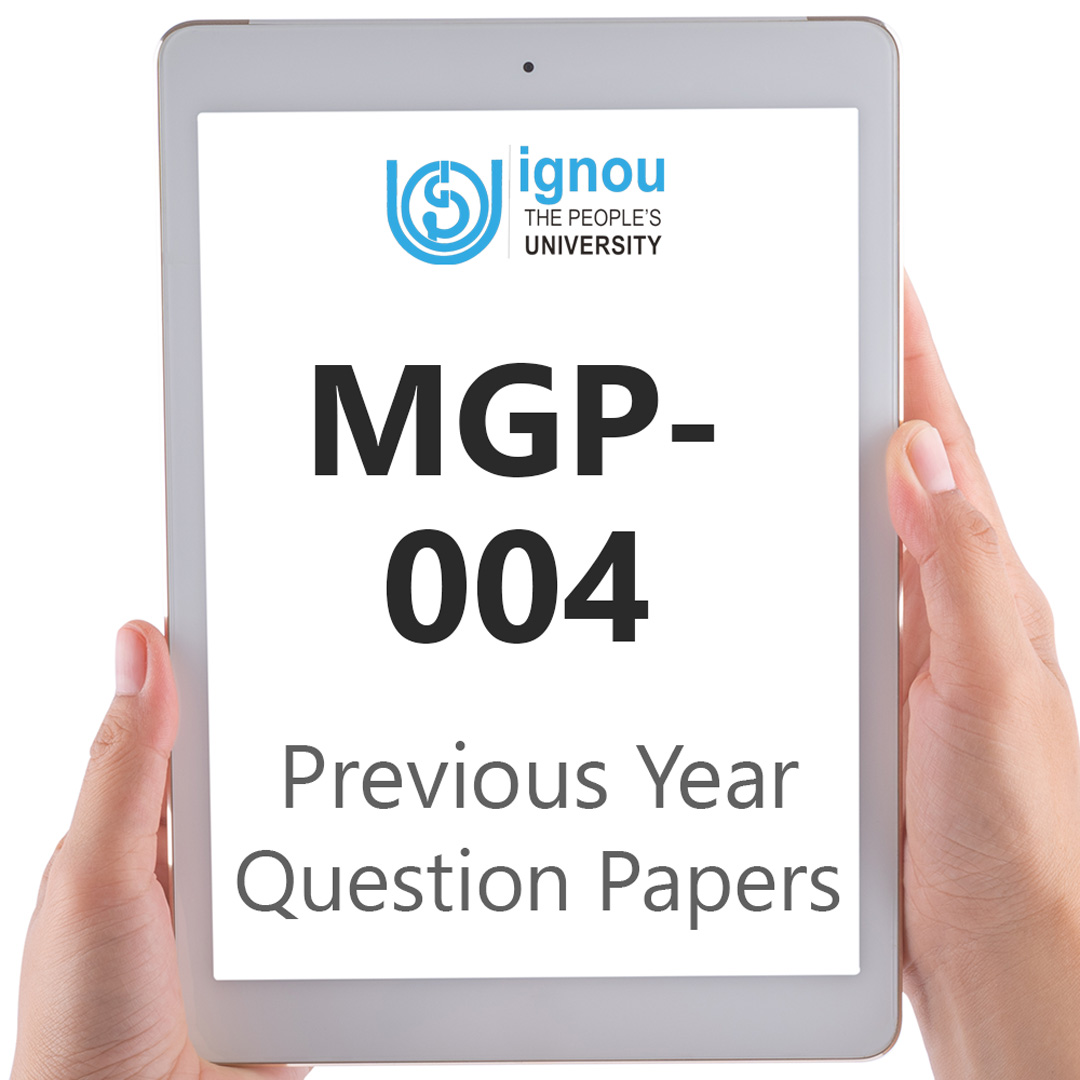If you are looking for MGP-004 IGNOU Solved Assignment solution for the subject Gandhi’s Political Thought, you have come to the right place. MGP-004 solution on this page applies to 2022-23 session students studying in MPS, MGPS, PGDGPS courses of IGNOU.
MGP-004 Solved Assignment Solution by Gyaniversity
Assignment Code: MGP-004/ASST/TMA/2022-23
Course Code: MGP-004
Assignment Name: Gandhi’s Political Thought
Year: 2022-2023
Verification Status: Verified by Professor
Answer five questions in all, selecting at least two questions from each section. Each question is to be answered in about 500 words. Each question carries 20 marks.
Section-I
Q1) What is the Gandhian view on structural violence? What is the impact of structural violence in society?
Ans) Gandhi did a good job of describing structural violence in his writings, but peace scholar Johan Galtung created pedagogy around the idea of structural violence, which is harm that is not physically imposed on another person but is concealed in structures. Galtung defines indirect violence as including both structural and cultural violence. When the social order directly or indirectly results in human misery and death, structural violence takes place. This violence can be politically oppressive and exploitational.
Gandhi's broad view of nonviolence has a significant impact on current discussions of peace and conflict. His theories are regarded by many experts as crucial to comprehending the idea of structural violence. Johan Galtung, according to himself, discovered the fundamentals of structural violence while studying at the Gandhian Institute of Studies in Varanasi in 1969. Gandhi's establishment of the separation between a person and a structure earned him the moniker "structuralist," according to him.
Galtung saw how violence is engrained in social structures rather than in individuals through Gandhian perspectives. Gandhi had a deep intuitive understanding of the repressive social structures and political institutions that cause violence. He was clear in his assertion that the structure, not the person who fulfilled his duty, was the source of the evil. He stated in another place that the goal of nonviolence is to eliminate enmities rather than the adversaries themselves.
Gandhi correctly identified colonialism as the archetypal instance of institutional violence. Gandhi argued that the caste system, within which people developed their consciousness and carried out their given jobs, as well as colonialism, was an oppressive institution. According to Gandhi's theory, evil is a by-product of the social order. Gandhi believed that economics that are harmful to a person's or a country's moral wellbeing are unethical, and that a political system devoid of religion and morals cannot provide the citizens' dignity, inner freedom, and fairness. Gandhi therefore had a strong disapproval of capitalism, not capitalism, racial discrimination, not white men, and modern civilization, not Westerners living in it.
Gandhi firmly asserted that the suffering people would not be helped by the simple replacement of the colonial white authority with brown rulers because of the systemic imperatives of oppression. He was concerned that the new leaders would continue to adhere to the goals, values, and dedication of the so-called modern civilisation, which in his opinion is based on merciless competition and unrestrained individualism. Individualism without boundaries is the rule of the wild beast, he remarked. It benefits both the individual and the society of which they are a member to voluntarily submit to social restriction for the benefit of everyone's well-being.
He vehemently denounced "modern civilization," which undermines human dignity and the spirit, in his seminal work, "Hind Swaraj." Gandhi believed that the unrestrained pursuit of human consumption, needs, and addiction to technical solutions would further polarise society and harm the mental health of the impoverished groups. Gandhi believed that modern society's customs were brutal and aggressive, favouring ambitious, competitive, harsh men whose sole goal was to increase their fortune and power. The reckless pursuit of modernity frequently engages in structural violence alongside a repressive state and tends to weaken the relationships that make up a meaningful community.
Q2) What is ideology? Explain Gandhi’s critique of socialism and communism.
Ans) An ideology is a system of ideas or convictions held by a person or a group. Ideology frequently refers to a set of political beliefs or a group of concepts that define a specific culture. Gandhi's core analytical and theoretical building block appears to be the individual, whose moral liberation would supposedly result in the moral uplift of society as a whole. Gandhi would not have accepted a collectivist understanding of the person and his or her place in society, therefore it was only natural for Gandhi to become one of the most ardent opponents of socialism and communism's philosophy and practise in many regions of the world.
Gandhi’s Critique of Socialism and Communism
When discussing Gandhi's opinions on socialism and communism, it is crucial to remember that Gandhi opposed them on the levels of both a political philosophy and an economic plan to alter a society's economic structure. Gandhi admired socialism and communism for their concern for the general populace and their efforts to ensure that their fundamental necessities were met. In addition, Gandhi has a long history of opposing communism and socialism. Because of this, he frequently engaged Nehru in spirited debates on the benefits of socialism as a suitable philosophy to base the future course of the country's activities on the same, despite having designated Nehru as his political heir.
In fact, Gandhi's ideological inclinations looked to be at odds with the most, if not all, of the major socio-economic, political, religious, and moral formulations of socialism and communism. Given the moral emancipation of the masses as the foundation of Gandhi's socioeconomic, political, and religious principles, it was only logical that they opposed the ideologies of socialism and communism, which aim to achieve the socioeconomic emancipation of the populace. Gandhi criticised socialism and communism as political ideologies because of their conceptions of human nature and their desire to create a society devoid of class and state.
Gandhi criticised them for undervaluing the fundamental nature of human individuality by viewing it as primarily selfish and motivated by aspirations of monetary success in society, similar to how he criticised liberalism. Gandhi effectively undermined historical materialism as a whole since it was seen to be based on an incorrect understanding of people. With the development of historical materialism, socialism and communism conceptually attempted to explain how human civilisation has changed through the millennia.
These ideas allegedly attempted to prove that the primary goals of every single person in society are to amass financial wealth and comfortable living conditions. The haves and the have-nots are two separate social strata that emerged in society as a result of the transition of human life from its natural state to that of a man-made order. The nature of socioeconomic interactions also underwent subtle changes in line with the shifting dynamics between the haves and have-nots, the most recent of which could be observed in the shape of capitalism. This well-known Marxist formulation's underlying thesis was that human nature was fundamentally materialistic and self-centred, which resulted in the ongoing exploitation of one class of people by another.
Q3) What was Gandhi’s view on totalitarian state and why he opposed fascism?
Ans) The fascist worldview calls for the creation of a totalitarian state that would cover nearly every element of social life, leaving no room for individuals to function independently. The fascist maxim, Everything for the state; nothing against the state; nothing beyond the state, was a representation of this ideology. The concept of a totalitarian state has two interrelated meanings in fascist ideology first, it results in the establishment of a typical fascist state in which the human personality is moulded into a distinctive shape, giving rise to the concept of the fascist man.
The fundamental trait of a fascist guy is his unwavering allegiance and support for the leader in an unlimited way, to the point where he is willing to dissolve his own personality into the personality of the leader for whose cause he would even be willing to lay down his life. Due of this, a fascist state's conception of man violates the liberal idea of a boundary between the state and civil society, according to two scholars. Unmediated communication between a leader and his followers means full participation and dedication on the part of the populace, effectively resulting in the politization of the masses.
Under the fascist formulation, the totalitarian state concept takes the lead, which Gandhi believed was inappropriate. Gandhi, a liberal thinker, supported the idea of the state having the smallest possible operational realm to allow for the fullest possible development of its citizens' personalities. He advocated for the obvious separation of the public and private spheres of social relations among the many institutions of government and gave greater weight to the individual's private life than the authoritarian domain of the state. Gandhi would never have permitted the state to monopolise a person's personality for the sake of the leader, therefore his views on the character of the state in fascism would have been completely at odds.
Gandhi’s Opposition to Fascism
The operationalisation of fascist ideology in various countries produced a number of modifications of the original formulations of the fascist philosophy as propounded by Italian leader Mussolini. One such modification appears to be the element of racialism that became very prominent in the operationalisation of the theory in Germany but was almost absent in its articulation in Italy. In other words, while racialism was not perceived to be a crucial element of the ideology of fascism when it was theorised and practised in Italy, it became one of the most critical components of the fascist philosophy as practised in Germany.
Theoretically, the notion of racialism is based on the belief that there exist plausible distinctions amongst the human beings in different parts of the world on the basis of the biological or genetic differentiations amongst them. Such racial differentiations may be taken to be the basis of arriving at political or social conclusions to formulate the policy of a state or individuals towards others. This understanding of racialism was adopted by Hitler as his state policy to pronounce the racial superiority of the German race calling them as Aryan or superior race in comparison to others, and more particularly the Jews.
Section-II
Write a short note on each part of the question in about 250 words:
Q6) (a) What are the reasons for Gandhi’s admiration of British institutions?
Ans) Gandhi's comprehension of British history and temperament led to the employment of the Satyagraha approach. Gandhi used the century-long fight for women's voting rights in Britain as an example of how pain must be measured in order for the British to surrender. He remembered that "an Englishman never respects you until you stand up to him," many years afterwards. He then starts to like you.
He has no physical fears, but he is deathly scared of his own conscience, especially if you use it to expose his wrongdoing. He first dislikes being corrected for wrongdoing, but after reflecting on it, it will consume him and hurt him until he takes action to make amends. He adhered to the fundamental notion of stages of constitutional agitation and open movements throughout, and he acknowledged that the doctrine of Satyagraha could only be used after other constitutional channels of protest had been used up.
Till Gandhi's return to India, the Indian educated mind was most troubled by the Indian National Congress leadership's ardent support of the Indians' battle in South Africa. Gandhi's intrinsic regard for the British sense of justice persisted even after his return to India, and during the First World War, he unconditionally recruited volunteers for the British army, in contrast to Jinnah and Tilak, who refused to do so without furthering the nationalist cause. The atrocities of the Jallianwala Bagh slaughter destroyed this belief he had in the supreme British sense of justice. Nevertheless, he declared in 1921 that his immediate goal was parliamentary swaraj, with the remainder being for a distant future, despite this shock and his general critique of Western civilisation and the parliamentary system.
Q6) (b) Gandhi’s views on economic basis of political independence
Ans) Gandhi believed that political independence without economic prosperity is useless. He is aware that unless the life of the common people is better, oppression could persist even after independence. He views the exploitation of an Indian neighbour as equally abhorrent as that of the British or any other foreign power. He expresses this in the Hind Swaraj by contrasting Indian and Italian experiences. Gandhi applies this insight to the situation in India and makes it crystal apparent that for him, India's official independence means very little.
It is of utmost importance to use the example of the Indian kings as the cause of the suffering and poverty of the Indian masses. It makes it very evident that political freedom and the general welfare of the population are closely related. Gandhi equates economic and political freedom. The wellbeing of the populace could be best achieved in self-sufficient villages. This emphasis is necessary since the vast majority of Indians reside in the country's seven hundred thousand villages, and until and unless these communities are revitalised, no practical solution to the Indian problem can be found.
Gandhi believed that society should not be structured as a pyramid but rather as an oceanic circle with the individual at its centre, willing to make sacrifices for his village, the village for a larger circle of villages, and so on until, at last, the entirety is made up of a single life made up of individuals. Despite Gandhi's early associations with the Ahmedabad mill workers, which are the vanguard for Marx and Engels, the urban proletariat has very little place in Gandhi's ideas. The urban proletariat represents a negligible portion of the have-nots in India's village-based economy and society, where any widespread, genuine welfare has yet to start.
Q2) (a) Critically examine Gandhi’s view on citizenship.
Ans) According to Gandhi, all states have an innate inclination for oppression and violence, especially the modern, highly bureaucratic state. His ideal society does not have centralised power. The three primary commandments of satya, ahimsa, and dharma served as the foundation for his conception of citizenship. Due to his belief that all states had a tendency to violate satya and ahimsa, Gandhi referred to the state as a soulless machine. He didn't trust the state since it stood for coercive power. Gandhi held the view that each individual person possesses dharma and is the moral arbitrator, with the authority to evaluate the state and its laws in accordance with the rules of dharma, which linked the fundamental ideas of satya and ahimsa.
Gandhi established the tone of Indian social ethical rethinking regarding the untouchables by being equally concerned with promoting equality among all societal sectors. He denounced the habit of the rest of society shunning and treating the untouchables as outcasts. He gave them a new name, Harijans, to give them human respect. He feared, and properly so, that the already fractured Hindu society would be further torn apart if the pact were made.
Gandhi's goal was to remove any stigma associated with being an Indian regardless of caste, creed, economic background, or religion by integrating the underprivileged classes into the nationalist majority on an economic, social, and cultural level. Gandhi is unyielding in his criticism of the upper orthodox Hindus for upholding the cruel caste system in this integrative and egalitarian movement, while simultaneously urging the downtrodden classes to rise to the occasion and give up undesirable habits that stand in the way of greater social acceptance.
Q2) (b) Why does Gandhi favour Gram Swaraj rather than western industrialization?
Ans) Gandhi is an outspoken opponent of all forms of western industrialization, arguing that while they create material things, they are incompatible with our moral standards. The village panchayat system and the village republic could provide a democratic participatory model while simultaneously providing a means of escape from the dangers of western industrialization. Gandhi advocates for a transformed rural environment where truth and nonviolence would coexist in a situation of harmony and promotion and practise of rural virtues of cooperation and performance of duties because he is aware that the current conditions of the villages are far from the ideal that he desires.
In the case of agricultural civilization, the natural order is not much altered. If there is any variety, it comes after a spontaneous mutation. Agriculture only facilitates or speeds up what occurs in nature over a long period of time. Variations from nature are especially violent in the industrial society's economic system because a lot of things are produced regardless of demand, and then sophisticated advertising is used to artificially increase demand for those commodities.
Gandhi harshly criticises modern technology and the negative impacts of modern industrialization in the Hind Swaraj to the point where he makes no concessions to any of its manifestations. The development of technology and industrialization is the primary source of human suffering and the "sin" of modern civilization. Gandhi was still living in England by the end of the 19th century, and factory laws and the expansion of the franchise helped to mitigate many of the negative effects of industrialization. However, they did not entirely reverse the main effects of industrialization; they simply lessened them. Gandhi understood the negative effects of industrialization with ease.





